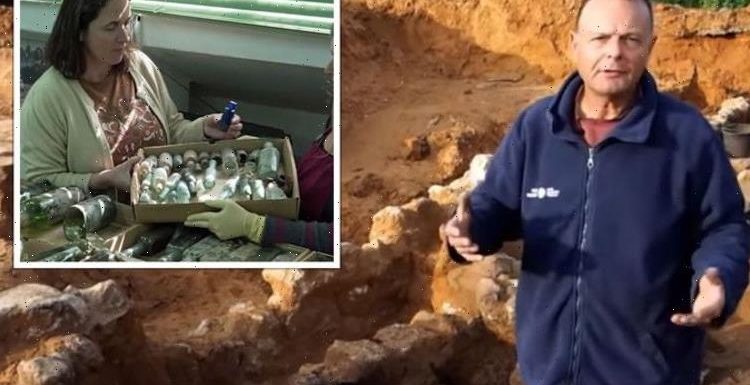
Israeli excavators uncover hundreds of liquor bottles from WWI
We use your sign-up to provide content in ways you’ve consented to and to improve our understanding of you. This may include adverts from us and 3rd parties based on our understanding. You can unsubscribe at any time. More info
The “exciting” discovery, which dates back more than 100 years, came following excavations in Ramla conducted by the Israel Antiquities Authority (IAA) in 2017. The team found buildings that were used by British soldiers during the war for up to nine months. Inside, hundreds of relics gave them a fascinating insight into the lives of those who were stationed in the Ottoman-controlled region at the time.
In a video shared by IAA earlier this month, Ron Toueg, director of the excavation, said: “The written historical record documenting the activities of British soldiers in Israel usually consists of “dry details, such as the number of soldiers, direction of attack, and the results of the battle.
“The discovery at Ramla and its finds provide us with a unique glimpse into the unwritten part of history and, for the first time, reconstruct the everyday life and leisure of the soldiers.
“During the excavation, we exposed the foundations building that functioned for agricultural purposes in the Ottoman period – which was later converted by the British military as soldier barracks to house soldiers during World War 1.
“Inside the building, we discovered dozens of uniform buttons, belt buckles, horse riding equipment, and other items that belonged to the British soldiers.”


Experts believe the find was hidden for so long as the building appears to have been burnt down at some point.
But the team were stunned by the amount of alcohol the soldiers appear to have drunk.
Mr Toueg added: “About 70 percent of the waste discarded in the refuse were liquor bottles, and it seems that the soldiers took advantage of the respite given them to release the tension by frequently drinking alcohol.”
Brigitte Ouahnouna, a researcher for the Israel Antiquities Authority’s glass department, added: “This is the first time in the history of Israeli archeology that an assemblage of hundreds of glass bottles from a World War 1 British army camp was uncovered.
“The bottles supplied to the soldiers and officers in the camp contained soda or an array of alcoholic beverages such as wine, beer, gin, or whiskey that were produced in Europe.”

Another exciting artefact found at the excavation, uncovered by archaeologist Shahar Krispin, was the tip of a swagger stick that belonged to a Royal Flying Corps officer.
Swagger sticks were carried by senior officers as a symbol of authority.
The tip of the stick was made of silver and stamped with the initials RFC of the Royal Flying Corps.
According to Assaf Peretz, a World War 1 expert: “To the best of my knowledge, this is the first item of its kind ever found in Israel.”
DON’T MISS
Germany faces worse gas crisis as Britain outsmarts Putin [INSIGHT]
Brexit Britain win as Blackstone to create 2,700 UK jobs [REPORT]
Ukraine and Hungary summon ambassadors over Russian gas [REVEAL]


The Ottoman Empire came into World War I as one of the Central Powers and fought the Entente in the Balkans and the Middle Eastern theatre.
Sherri Mark, an architect, conservator, and researcher of the British Army in the region, said: “On November 15, 1917, the Egyptian Expeditionary Force under the command of General Allenby conquered the area around the towns of Lod and Ramla.
“Before occupying Jerusalem, the army encamped in the area where the archaeological excavation took place: the headquarters at Bir Salam – Ramla Camp and Sarafand Camp.
“The Army was based there for about nine months until a decision was made to continue the country’s conquest”.
Source: Read Full Article